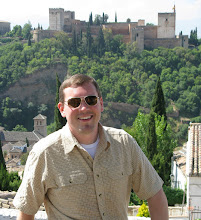I attended this afternoon a memorial service for my friend, Ruth, who took her own life this past weekend. I'm not aware if Ruth were Quaker, but she worked at a Quaker college, and her colleagues there organised an unprogrammed, Quaker-style memorial service to remember her.
(Allow me to explain parenthetically what that last bit means. Quakers are the Religious Society of Friends and call themselves "Friends". Friends don't go to Mass or worship in a church, they attend Meeting for Worship in a Meeting House. Traditional Quaker worship is "unprogrammed" -- unstructured compared to the liturgies and orders of worship of other Christian denominations. Once the congregation is assembled and seated facing one another, congregants take turns rising and speaking as the Spirit moves them. Otherwise, there is silence. Each person waits for the "still, small voice of God" to move him or her to speak. An entire hour could pass without anyone being moved to say anything, but Friends find significance in this, too. When the elders of the congregation feel a consensus that all hearts and minds are pure and clear, they lead the congregation in shaking hands before they disperse. "Programmed" meetings also exist and follow an order of worship similar to that of Baptists or Methodists. BBC have a good, concise explanation of Quaker Worship, while the Wikipedia entry on the Religious Society of Friends is quite detailed and discusses programmed and unprogrammed worship, as well as Quaker memorial services and other traditions and beliefs.)
So, Ruth's memorial service was like a communal eulogy. The campus ministry coordinator rose and made a few comments to orient those unfamiliar with unprogrammed meeting. A colleague of Ruth's read a prepared biographical statement about Ruth that would become part of the college record. Many others spoke about their memories of Ruth or the last time they saw Ruth, shared funny anecdotes about Ruth, and described the ways in which Ruth had touched each life, however briefly.
The landlady of the house that Ruth and her husband rented stood and explained that she and her husband made it their policy to avoid meddling and to stay out of their tennants' personal business. She expressed her regret for that policy in this case, explaining that she wished that she "had been more nosy" and "asked questions" and gotten to know this intriguing person of whom our comments where weaving a tapestry.
The most telling comments were those of Ruth's mother, who described Ruth as someone for whom life was never easy and for whom every day was like a tight-rope walk. She explicitly mentioned Ruth's dyslexia and left me believing that Ruth did, indeed, struggle with burdens other than her obvious tremours without mentioning what they might've been. She said that she thought that Ruth had finally made it (past some unmentioned hurdle) and would mellow and take life a bit more easily once she reached middle-age. She said that she was "curiously" at peace with her daughter's death and that she wished that same peace for Ruth now, as well as for all of us. Yes, we were all crying by the time that she finished speaking. For a mother to stand and declare with loving words to a room full of strangers that she is at peace with her daughter's death after less than a week makes a powerful statement to those that hear it.
The whole experience was quite cathartic for everyone involved and I must believe that it was especially so for her parents, who had travelled from New Mexico to North Carolina to lay their daughter to rest and comfort their son-in-law and who likely had little knowledge of Ruth's interactions with the 250 or so people in attendance.
I still don't have a clear answer about why Ruth chose to leave us, but with the peace that Ruth's mother shared with us, I can get by without one. :J

